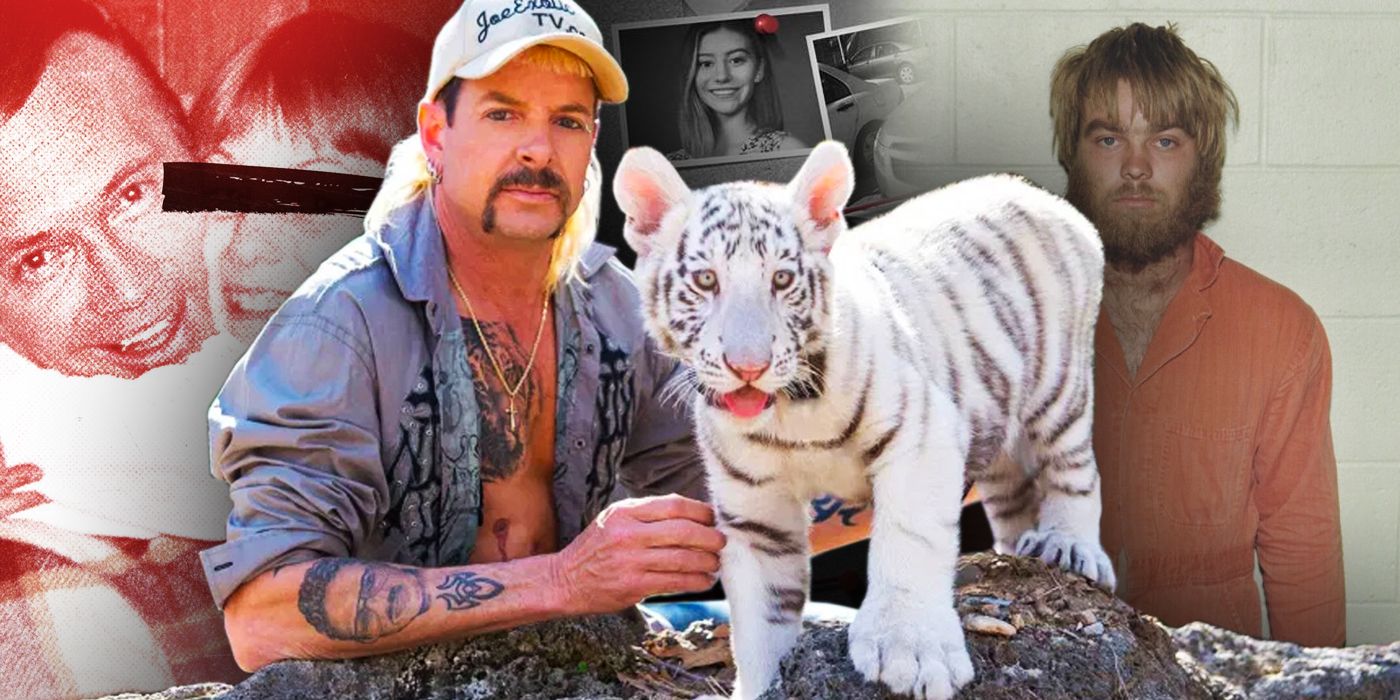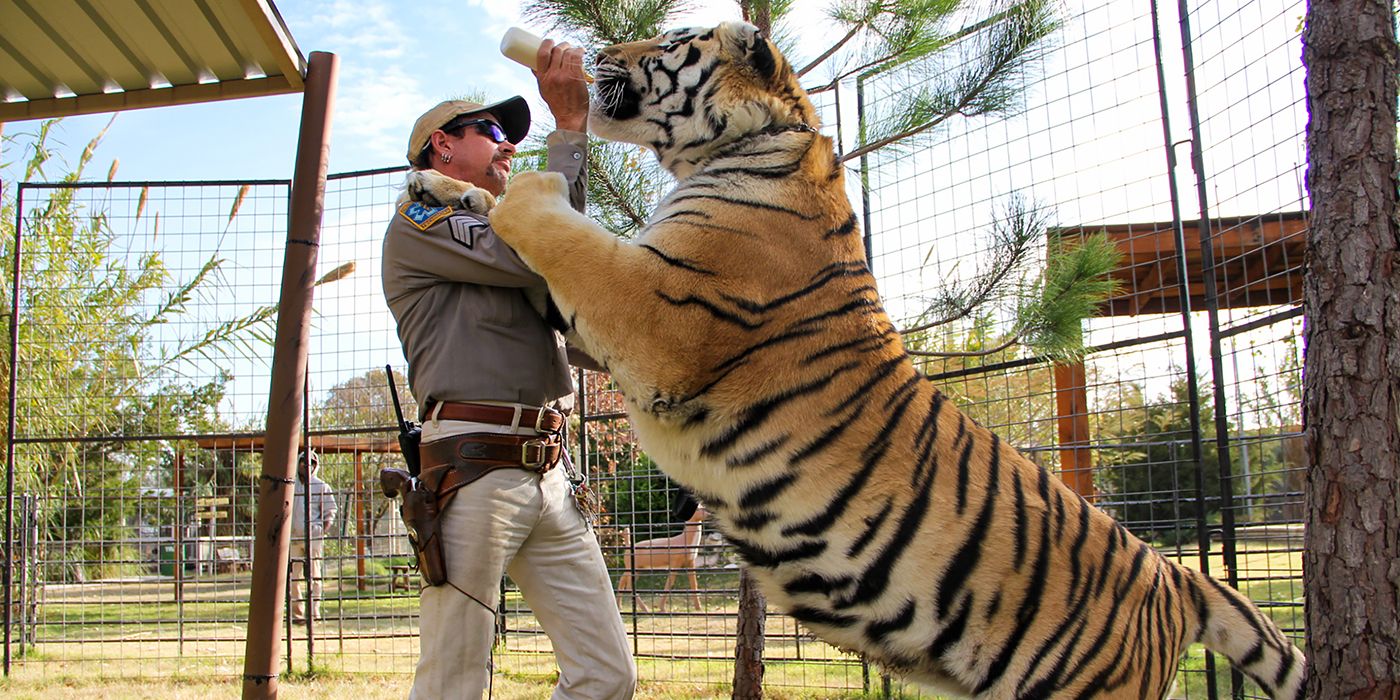Netflix's Tiger King continues a worrying descent of true crime into pure sensationalism. The latest entry in a string of documentaries that present so-crazy-it-must-be-true stories yet lack any clear message or moral follows the now-infamous drama between big cat owners in the southern states of the USA, specifically private zoo owner Joe Exotic and his vendetta against animal rights activist Carole Baskin.
Releasing on March 20, early on in the global COVID-19 pandemic, Tiger King is another unprecedented Netflix hit. Its viewership exceeds that of streaming crown jewel Stranger Things season 2, and the case for Joe Exotic's pardon (he was arrested in 2018 for plotting to murder Baskin) has been addressed by President Donald Trump. In a time when audience attention on home content couldn't be higher, many were choosing Tiger King. Unfortunately, all the memes and hype appears to have hidden one key aspect of the documentary from the discussion: it's not really saying anything.
Despite positioning itself as a warts-and-all documentary, Tiger King's primary purpose is as a piece of entertainment, presenting a narrative in a manner designed to keep you watching (see: long-lead teases of Joe's incarceration, left-field twist cliffhangers) but it does so by losing any grasp of message. The show ends with a short text card saying that more tigers are in private captivity in the United States than are in the wild worldwide, but that's actually a reiteration of an episode 1 statement and, in practice, such concerns are almost opposite to the drama of the series
Tiger King Chooses Redneck Drama Over Documenting Animal Cruelty
After the first couple of episodes of framing, Tiger King's big cat obsession could be narratively exchanged for any obscure pursuit, the story more a redneck zoo of its own. And the captives aren't happy. Carole Baskin has decried her presentation as a husband-murdering sociopath, and Joe Exotic's husband John Finlay has spoken out about his literally toothless portrayal. When there's claims of murder and addiction being thrown around, such reactions are to be expected. But as the dust settles on the show, there's more and more overlooked details coming to light that highlight an extreme degree of creative license. That Joe didn't write or perform the songs he released may not be a crime, but it's essential context to his misleading self-image. And when it takes an additional special episode to reveal that the Tiger King may be, in fact, afraid of tigers, it's evident that the show was edited for maximum impact to the point of obscuring key facts.
Plainly, while Tiger King does indeed document Joe Exotic, it does so without fulfilling the innate need to inform and educate the audience about its subject beyond sensationalist drama. There's merit in that, especially at a time when pure escapism is tantamount to a necessity, but it weakens what could have been. Tiger King is successful because it dispenses with what makes the story worth telling.
It didn't have to be this way. In 2011, documentarian extraordinaire Louis Theroux visited the G.W. Zoo to spotlight Joe Exotic as part of his "America's Most Dangerous Pets" episode. It's a strikingly different handling of the situation. Carole Baskin isn't even mentioned (this was before any murder plots), and the focus is very much on the ethics of keeping wild animals domestically. Joe is presented as an eccentric, yes, but the focus is on him as businessman, zoo-owner and tiger cub breeder. Theroux is also not blinded by the camera-friendly big cats, making sure to clarify it's primates that pose the most danger to owners. In one hour (a fifth of the total runtime of Netflix's exploration), Theroux manages to get deep into the uncomfortable waters, challenging those who own the pets and leaving the viewer to question the morality of those involved beyond legality.
Tiger King Is More Lazy True Crime From Netflix
For April Fool's, Screen Rant ran an article joking that Netflix was planning a crossover special between Joe Exotic and Making A Murderer's Steven Avery, looking at two incarcerated men and their distinct fights for freedom. It was a borderline ridiculous proposition, one that would by concept put both men's incredibly different plights to one side to feed audience hunger. It was an attempt to highlight the increasingly unsettling handling of such stories; Making A Murderer season 2 did little to extend the case and functioned primarily as more content. However, since April 1, Netflix has posted actual recorded calls with Joe Exotic from prison and a hastily put-together after-show Tiger King & I where streaming perennial Joel McHale interview most of the key players (give or take a cool cat and kitten) and Nicolas Cage is set to star as Exotic in a drama adaptation. This extension isn't quite as brazen as the gag press release, but betray the purpose behind the streaming service's true crime output.
Indeed, this isn't a single show issue, but a slow erosion of what the true-crime documentary can offer. Documentaries as a form have grown dramatically as a commercial force over the past couple of decades - first in arthouse cinemas, then more mainstream and boosted by streaming - as has the morbid fascination with the real-yet-ridiculous. There's a greater variety of stories to be told by unique voices and, in many ways, Netflix has been at the forefront.
Wormwood, an Errol Morris docu-drama that begins exploring the use of LSD as part of Project MKUltra that led to an agent's suicide but pivots to spotlight the obsession of his son to gain closure (the title is a reference to the similar madness in Shakespeare's Hamlet). Wild Wild Country put the spotlight on Bhagwan Shree Rajneesh and his followers, contrasting their very real terror attacks against changing American culture. American Vandal delightfully sent up the genre's tropes before being canceled after two seasons. And this is before getting to the many other documentaries that find their home on Netflix or similar services, like long-lost triplet expose Three Identical Strangers or all-encompassing epic O.J.: Made in America.
Yet time and again the more buzz-worthy shows are the more scintillating and empty. Making A Murderer, Tiger King, Abducted in Plain Sight (which explores pedophile grooming but sidesteps to visceral stories of intermarital affairs with both partners) were all mini cultural moments and certainly engrossing watches for their runtimes, yet land on the other side of the insight line. They don't leave the audience having learned all that much, they simply divert attention from the real dangers at hand. Tiger King is a facile show that diverted attention at a trying time, nothing more.



